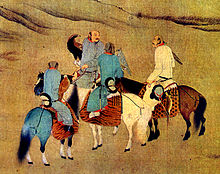
Image: The Khitans at the eagle hunt
Courtesy: https://en.wikipedia.org/wiki/Khitan_people
This chapter brings to light the life of Yelu Dashi, the first candidate on the role of Prester John.
This Khitan prince, whose dynasty was ousted from power by a rival nomadic confederation, fled to Central Asia where he carved an empire. His outstanding victory over the Seljuk emperor caused the legend of Prester John to take root among the Latin crusaders. In their view, the confrontation with the Muslim host would qualify the opponent to be a Christian.
In reality, the Kara Khitai Empire combined the nomadic and sedentary segments who were loosely united by the imperial regime based on a standing army. The emperor declared the freedom of conscience and did not exaggerate in his demands of tribute and troops from the dependent populations.
The man, who embraced both the Buddhist and the nomadic cultures, had never dreamed of conquering the Near East and protecting Jerusalem from Muslim imminent assault.
Here is a short extract:
The Khitans, people of Mongolian origin known to the Muslim world as the "Turks from China", belonged to a loose tribal confederation of steppe nomads. Consolidated in Manchuria, they annexed northern China and launched an empire under the leadership of the Liao dynasty. The royal clan Yelu and the nobility adopted the Chinese language and culture and took up the trappings of the ‘Middle Kingdom’, such as the calendar, coins, and seals. However, many of them retained nomadic customs, like wearing traditional dress and haircut as well as clinging to shamanist traditions.
Ousted from power by their former vassals in the early twelfth century, the Sinicized nomads put up with the foreign rule except for a tiny band of fugitives that slipped away to the desert and found temporary shelter in a distant outpost. This remnant of the past glory was led by Yelu Dashi, a scion of the royal clan, who put on his mettle in border conflicts as an apt military commander.
The ringleader managed to convince the garrison to take his side, took hold of imperial herds of horses, and summoned warriors from any background to join his camp. His call proved attractive to many desperados who risked casting their lot with a charismatic leader. New followers joined in grooves, and soon the faction grew up into the private army which had no scruples to encroach on neighboring lands. When the leader's initial plans to win his homeland back cracked, he changed his strategy, casting glances to the west. Subduing nomadic tribes along with the sedentary population of Central Asia, the expatriate devoid of any territorial base embarked on a grand enterprise, carving out a successor empire.
The ruler expanded his political influence at the expense of weaker neighbors until most of the region unfolded before him like a red carpet. Called the Kara Khitai Khanate, the new empire included the core territory under the direct control of their overlord and a bunch of vassal states and dependent tribes.
To rule over this "melting pot", Yelu Dashi had to adopt a couple of titles which reflected the special role of the Kara (Turkish: ‘black’) Khitai in pacifying the sedentary and nomadic populations. The head of the state was recognized as the Chinese emperor by the former and as the Gurkhan (Mongolian: "supreme leader") by the latter. The dual image helped the founding father consolidate his power among the debris of the shattered past and the dreams of a new destiny. A glimpse of China, which he offered to his subjects, was a mysterious country that boasted of its social order, classical education, enormous wealth, and outstanding achievements.
A shrewd statesman, Yelu Dashi carried charisma which made his position of Gurkhan uncontested. According to Ibn Al-Athir, “He was a handsome and good-looking man who wore only Chinese silk. His men held him in great awe.” [The Chronicle of Ibn Al-Athir for the Crusading Period. (Ashgate Publishing Ltd, 2010), 363] His powerbase constituted tens of thousands of Khitan households-a safety island in the ocean of his alien subjects.
No comments:
Post a Comment